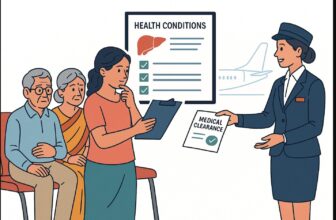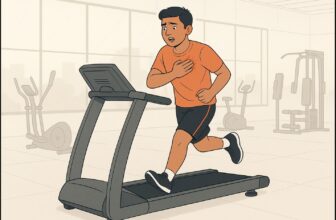Back pain is a widespread issue that affects millions across India. It can range from a mild discomfort to a debilitating condition, impacting daily routines and work productivity. If you’ve ever dealt with back pain, you know how much it can affect your overall quality of life.
In this listicle, we’ll explore the 10 most common causes of back pain in India, providing practical insights into each cause, its impact, and ways to prevent it.
1. Sedentary Lifestyle and Poor Posture
In today’s digital age, long hours spent sitting in front of computers, tablets, or smartphones are becoming more common. This sedentary lifestyle can lead to poor posture, which places unnecessary strain on the spine. Over time, it weakens the muscles that support your back, contributing to conditions like disc degeneration and spondylosis.
Many office workers, students, and people with desk jobs are especially at risk. The good news is that simple changes like regular stretching, adjusting your workstation, and taking breaks to stand and walk can make a significant difference.
2. Obesity and Overweight
Excess weight, particularly around the abdomen, adds pressure on the spine. This extra load can lead to disc degeneration and other spinal issues. In urban India, where obesity rates are rising, back pain is becoming increasingly common.
Maintaining a healthy weight through regular exercise and a balanced diet can relieve pressure on your spine, reduce back pain, and improve overall health.
3. Occupational Strain
Certain professions that require heavy lifting, bending, or prolonged periods of standing or sitting can place significant strain on the back. People working in construction, healthcare, or manufacturing are particularly prone to back pain due to the physical demands of their jobs.
Taking preventive measures, such as using proper lifting techniques, ensuring ergonomic workstations, and wearing supportive footwear, can help reduce the strain on your back and minimize the risk of injury.
4. Spinal Conditions
Spinal issues such as spondylolysis, spinal stenosis, and herniated discs are common causes of back pain. These conditions occur when stress fractures, narrowing of spinal canals, or disc material protrusion place pressure on the nerves.
The pain can be sharp and may radiate to the legs. If you’re experiencing persistent back pain, it’s important to seek medical advice. A combination of physical therapy, exercise, and in some cases, surgery, can help manage these conditions effectively.
5. Kidney-Related Issues
While kidney problems might not immediately come to mind when thinking about back pain, conditions like kidney stones or kidney infections can cause referred pain in the lower back. The pain can be sharp and intense, often making it difficult to pinpoint its origin.
If you notice pain along with changes in urinary patterns or fever, it’s essential to consult a healthcare provider. Proper hydration and regular medical check-ups can prevent kidney issues that may lead to back pain.
6. Pregnancy and Hormonal Changes
Pregnancy brings about several physical changes that can affect the back. The growing belly and hormonal changes relax the ligaments in the spine, leading to discomfort and pain in the lower back. Postpartum, the body’s recovery process can also strain the back.
Prenatal exercises, such as yoga or swimming, can help strengthen the muscles supporting your back. After childbirth, focusing on body mechanics and physical therapy can alleviate back discomfort.
7. Psychological Factors
Stress and mental health issues like anxiety and depression can manifest physically, often in the form of muscle tension and back pain. When you’re stressed, your body tends to tighten muscles, especially around the back and shoulders, which can lead to discomfort or even chronic pain.
Practicing relaxation techniques such as meditation, deep breathing, or mindfulness can help manage stress and ease the physical symptoms that come with it, including back pain.
8. Vitamin D Deficiency
Vitamin D is essential for bone health, and a deficiency can weaken the bones and muscles, making the spine more susceptible to injury. This is particularly common in urban India, where people often have limited sun exposure.
Spending time outdoors to absorb sunlight and eating foods rich in vitamin D, such as fortified milk and eggs, can help prevent back pain associated with vitamin D deficiency.
9. Smoking
Smoking affects the body in many ways, and the spine is no exception. It reduces blood flow to the spine, impairing the delivery of oxygen and nutrients that keep the spinal discs healthy. Over time, this can lead to disc degeneration and chronic back pain.
Quitting smoking can not only improve your overall health but also protect your spine from the degenerative effects that smoking causes.
10. Aging
As we age, our bones and joints naturally undergo wear and tear. The intervertebral discs lose water content, making them less effective at cushioning the spine. This leads to conditions like degenerative disc disease and osteoarthritis, both of which can cause persistent back pain.
Staying active, stretching regularly, and maintaining a healthy weight can help mitigate the effects of aging on the spine. Regular check-ups with your doctor can also help catch early signs of degenerative conditions.
Preventing and Managing Back Pain
While some causes of back pain are unavoidable, many can be managed or even prevented with the right lifestyle changes and precautions. Here are a few tips to keep your back healthy:
- Exercise Regularly: Activities like walking, swimming, and yoga can strengthen your back muscles and improve flexibility.
- Practice Good Posture: Ensure that your workstation is ergonomically designed and avoid prolonged sitting. Regular breaks to stretch or walk can help prevent strain.
- Maintain a Healthy Weight: Extra weight puts pressure on the spine, so a balanced diet and exercise are crucial.
- Quit Smoking: If you smoke, quitting can significantly reduce your risk of back pain and improve overall health.
- Manage Stress: Incorporating relaxation techniques into your routine can help alleviate the physical symptoms of stress, including muscle tension and back pain.
If you’re experiencing chronic or severe back pain, it’s always best to consult a healthcare professional for a proper diagnosis and treatment plan.
Conclusion – Preventing Back Pain in India
Back pain is a common issue faced by many in India, with a wide range of causes ranging from lifestyle habits to underlying medical conditions. Understanding these causes is the first step toward prevention and management. By making conscious efforts to improve posture, stay active, and maintain a healthy weight, you can significantly reduce your risk of back pain.
It’s also essential to recognize when professional help is needed to address more serious conditions. Taking a proactive approach can not only prevent discomfort but also enhance your overall quality of life.





